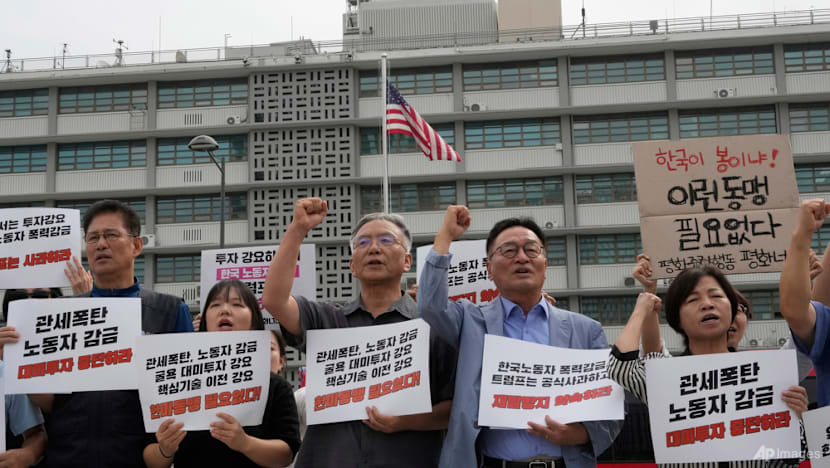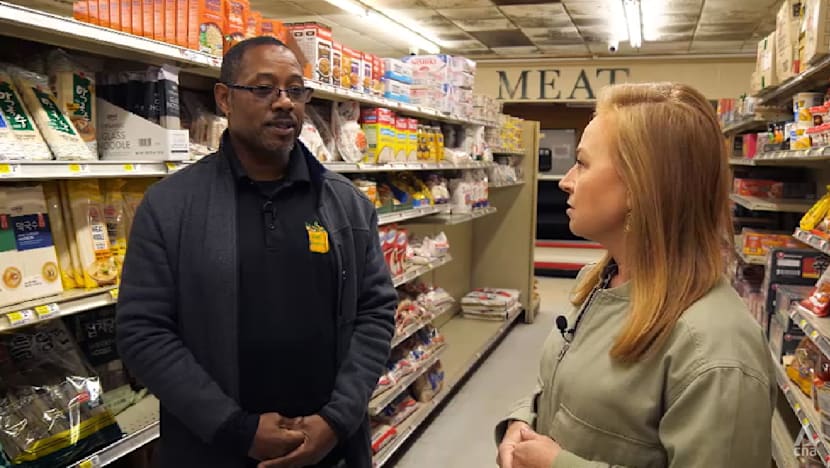US immigration raid on Hyundai plant exposes visa gaps, raises investment concerns
The fallout from the raid at the plant in Georgia on Sep 4 has been far-reaching, straining diplomatic ties between Washington and Seoul.


This audio is generated by an AI tool.
GEORGIA: Nearly half the products on the shelves of Viet Huong Oriental Market in Ellabell, Georgia, are Asian imports – catering mainly to South Korean workers at the nearby Hyundai assembly plant.
Owner and manager Sammie Rentz invested about half a million dollars to open the grocery store in March, around the same time Korean automaker Hyundai officially launched its massive new facility.
“I’d see a good 60 to 70 Koreans a day,” said Rentz, adding that business was so brisk he had even considered expanding.
“They’d fill up a cart or maybe two, with groceries for their families and I’d see them maybe twice a week.”
But the boom was short-lived. Sales have plummeted since immigration authorities detained about 300 South Koreans in a sweeping raid at the Hyundai plant on Sep 4.
Rentz said that unless business picks up soon, he may be forced to close the store within two to three months.

VISA ISSUES
The sprawling Hyundai campus was expected to create more than 8,500 jobs and transform the area’s economy.
But the fallout from the raid has been far-reaching, straining diplomatic ties between Washington and Seoul.
Most of the workers detained were in the United States under a 90-day visa waiver programme, commonly referred to as the Electronic System for Travel Authorization (ESTA), or B-1 business traveller visas.
In the days following the raid, South Korean President Lee Jae Myung said companies would most likely hesitate to make future investments in the US unless the visa system was improved.
Asked on Monday (Oct 27) about the immigration raid during his visit to South Korea, US President Donald Trump said an improved visa system would make it easier for firms to bring in skilled workers.
The US currently lacks a visa suited for specialised technicians temporarily working at investment sites while being paid by a foreign company.
“There isn't a visa that was really designed for this purpose, even though we know it's in our national interest (and that) it'll create jobs,” said Julia Gelatt, associate director of the US immigration policy programme at American think-tank Migration Policy Institute.
“So we're seeing companies bend the rules,” she added, noting that it is common practice for firms to bring workers in on the B-1 visa or on the ESTA.
ATTRACTIVE TARGET FOR INVESTMENTS
In a statement to CNA on Oct 8, a White House spokesperson downplayed concerns that the raid could deter future investment.
The administration “will work with any company investing in the United States by slashing regulations and enabling companies to bring in technical experts to set up facilities and train up American workers”, said the statement.
Arius Derr, director of communications at the Korea Economic Institute of America, a US policy institute, described the raid as a blip on the investment radar.
“These are long-term investments that are absolutely going to continue, whether or not the immigration policies or the tariff policies change from Washington's perspective,” he said.
“The US still has the demand. The US still has the energy prices, the liquid capital markets that make this country an extremely attractive investment proposition.”
EXPANDING ITS PRESENCE
Instead of pulling back, Hyundai is doubling down on its US expansion.
Just two weeks after the raid, CEO Jose Munoz announced an additional US$2.7 billion investment in the Ellabell plant.
“We are reaffirming our commitment to the community and the region and to the future of mobility,” he said.
“Our investments in North America are not reactive. They are part of a long-term strategy.”
That strategy includes producing more than 80 per cent of the vehicles Hyundai sells in the US domestically by the end of the decade.
















